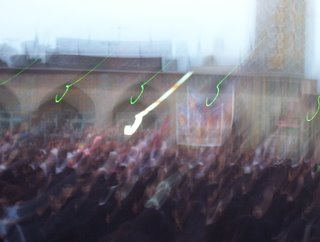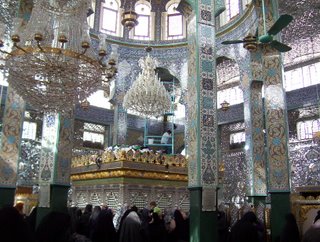As religious students, we were all encouraged to attend the local hijab demonstration. Unlike most times, when we are discouarged from or simply not allowed to leave the religious school, they actually brought buses so as many students could go as possible. I am somewhat ashamed that my reasons for going were somewhat less than pure -- quite frankly, I just wanted to get out; and also, I was curious. So, clad in a black chador, black scarf, and black manto, I boarded the bus with the other (mostly Iranian) students.
The bus took us to the main masjid where they give the Friday prayers. As we entered the masjid, men served us small plastic glasses of Iranian lemonade and offered us packages of cookies. I thought the hospitality was a nice touch. As we were seated, women in black chadors with sashes and featherdusters lined the area, creating a semicircle behind us. Overall, the masjid was about three quarters full. The women -- all wearing black chadors, black scarves, and black mantos -- listened with varying degrees of attention as a lady giving a speech reminded us that hijab really was wajib and cautioned us against giving into our baser desires by talking to unrelated men. During the speech, the women around me began adjusting their chadors as a television crew filmed both the speech and the audience. Periodically, the women behind me would chant (somewhat wanly), "Allahu akbar, Khamene'i rahbar, death to the enemies of wilayat al-faqih." I thought we would also have to chant "Death to America" like they do at the Friday prayers, but I guess America wasn't the focus of the demonstration. After listening to the speeches for a while, I began to examine the package of cookies, and after deciphering the ingredients in Farsi and discussing the contents wtih my neighbor, I was somewhat disappointed to learn that I couldn't eat them (see the April archives about my allergies). Afterwards, a man came up front and began reciting azaa for Hazrat Fatimah Masoumah (saa); that part I liked.
After a reminder that we were supposed to march silently, we crowded back out of the masjid into the street (Iranians aren't big on lines; they tend to move in large bunches). As we marched mostly silently behind big banners about hijab, scores of religious scholars and women in black chadors (occasionally with a bit of hair peeking out) lined the street and stared. I felt that perhaps I shouldn't be in a hijab demonstration after all since I was at the time cursing my chador which was blowing every which way and hoping no one could hear me. As we walked, I struck up a (quiet) conversation with one of the girls next to me. I asked her why they were having a hijab demonstration in Qom since everyone here already wears chadors. She said that, unlike in prior times, women nowdays have started to wear colored scarves and pants and sweaters under their chadors instead of mantos. I suggested that since most women in Qom already knew that they had to wear hijab, rather than simply telling them again that they had to wear proper hijab, they should investigate the roots of the social change and address them directly. She said the reason was obvious why women in Qom were not covering properly -- the people were being brainwashed by Western movies. I pointed out that most girls I know were pressured to adorn themselves by family, friends, fiancees, and husbands, and not
Jurassic Park, but she insisted it was the movies
Finally, we halted in a big square, and a man began giving a speech from a rooftop. At that point, I realized that we were about 10 feet away from the local women's Internet cafe (where I am now), and I began begging my friend to come with me. (Yes, I know it's pathetic, but we don't get many opportunities to go online here. If they restricted us less, I wouldn't be trying to skip out of things) However, unfortunately there was no time, because we had to go to a memories service for a friend of mine who had passed away, so we inconspicuously slipped away from the crowd of women, bought some juice, and went to go console the family of the deceased.


